| Listing 1 - 10 of 39 | << page >> |
Sort by
|
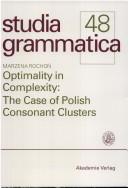
ISBN: 3050035196 9783050035192 Year: 2000 Volume: 48 Publisher: Berlin Akademie Verl.
Abstract | Keywords | Export | Availability | Bookmark
 Loading...
Loading...Choose an application
- Reference Manager
- EndNote
- RefWorks (Direct export to RefWorks)
Polish language --- Optimality theory (Linguistics) --- Consonants --- Phonology --- 808.4 --- -Polish language --- -Polnisch language --- Polski language --- Lechitic languages --- Kashubian language --- Optimality (Linguistics) --- Optimization (Linguistics) --- Generative grammar --- Pools --- -Pools --- 808.4 Pools --- -Optimality (Linguistics) --- Polnisch language --- Polish language - Consonants --- Polish language - Phonology
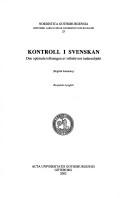
ISSN: 00781134 ISBN: 9173464287 9789173464284 Year: 2002 Volume: 25 Publisher: Göteborg Acta universitatis Gothoburgensis
Abstract | Keywords | Export | Availability | Bookmark
 Loading...
Loading...Choose an application
- Reference Manager
- EndNote
- RefWorks (Direct export to RefWorks)
Swedish language --- Optimality theory (Linguistics) --- Infinitive. --- -Ruotsi language --- Svenska language --- Scandinavian languages --- Optimality (Linguistics) --- Optimization (Linguistics) --- Generative grammar --- Infinitive --- -Infinitive --- Optimality theory (Linguistics). --- -Optimality (Linguistics) --- Ruotsi language --- Swedish language - Infinitive.
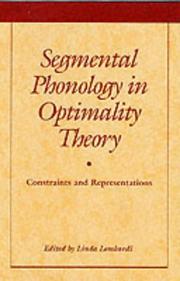
ISBN: 0521790573 0521153506 0511570589 9780511570582 9780521790574 9780521153508 Year: 2001 Publisher: Cambridge Cambridge University Press
Abstract | Keywords | Export | Availability | Bookmark
 Loading...
Loading...Choose an application
- Reference Manager
- EndNote
- RefWorks (Direct export to RefWorks)
Optimality theory has rapidly become the dominant framework in formal phonological theory. OT fundamentally revises the basic notions of generative grammar, replacing rules and derivations with a system of interacting constraints. Early work in OT tended to concentrate mainly on prosodic phonology and the phonology-morphology interface, and it was not initially clear how the theory could attack the rich range of phenomena found in segmental alterations. However, there is a body of work that concentrates on working out the details of featural phonology with OT, and this work shows that the theory allows superior explanations of the typological possibilities and the underlying motivations for these phenomena. This volume, first published in 2001, brings together work by some of the influential researchers in this area, ranging from the authors of influential dissertations to prominent senior faculty.
Phonetics --- Grammar, Comparative and general --- Optimality theory (Linguistics) --- Phonology. --- Optimality theory (Linguistics). --- Optimality (Linguistics) --- Optimization (Linguistics) --- Generative grammar --- Linguistics --- Philology --- Grammar, Comparative and general Phonology --- Phonology
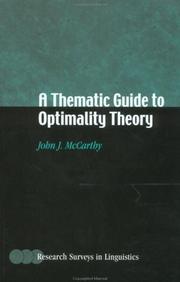
ISBN: 0521791944 052179644X 0511613334 0511826109 Year: 2002 Publisher: Cambridge Cambridge University press
Abstract | Keywords | Export | Availability | Bookmark
 Loading...
Loading...Choose an application
- Reference Manager
- EndNote
- RefWorks (Direct export to RefWorks)
This book describes Optimality Theory from the top down, explaining and exploring the central premises of OT and the results of their praxis. Examples are drawn from phonology, morphology, and syntax, but the emphasis throughout is on the theory rather than the examples, on understanding what is special about OT and on equipping readers to apply it, extend it, and critique it in their own areas of interest. To enhance the book's usefulness for researchers in allied disciplines, the topdown view of OT extends to work on first- and second-language acquisition, phonetics and functional phonology, computational linguistics, historical linguistics, and sociolinguistics. Furthermore, to situate OT for those coming from other traditions, this book also contains much discussion of OT's intellectual origins, its predecessors, and its contemporary competitors. Each chapter concludes with extensive suggestions for further reading, classified by topics, and supplemented by a massive bibliography (over 800 items). The book ends with a list of frequently asked questions about Optimality Theory, with brief answers and pointers to a fuller treatment in the text.
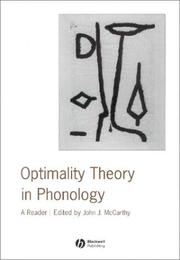
ISBN: 0631226893 Year: 2004 Publisher: Malden Blackwell
Abstract | Keywords | Export | Availability | Bookmark
 Loading...
Loading...Choose an application
- Reference Manager
- EndNote
- RefWorks (Direct export to RefWorks)
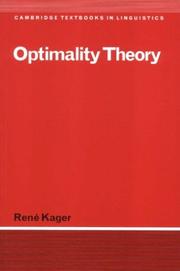
ISBN: 9780521580199 9780511812408 9780521589802 0521580196 0521589800 Year: 2004 Publisher: Cambridge Cambridge University press
Abstract | Keywords | Export | Availability | Bookmark
 Loading...
Loading...Choose an application
- Reference Manager
- EndNote
- RefWorks (Direct export to RefWorks)
Optimality theory (Linguistics) --- Optimality theory (Linguistics). --- 801.56 --- 801.56 Syntaxis. Semantiek --- Syntaxis. Semantiek --- Optimality (Linguistics) --- Optimization (Linguistics) --- Generative grammar --- Grammar
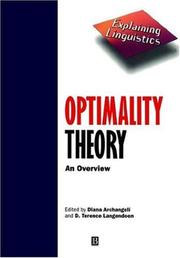
ISBN: 0631202269 0631162569 0631202250 9780631202264 9780631162568 Year: 1997 Volume: 1 Publisher: Oxford Blackwell
Abstract | Keywords | Export | Availability | Bookmark
 Loading...
Loading...Choose an application
- Reference Manager
- EndNote
- RefWorks (Direct export to RefWorks)
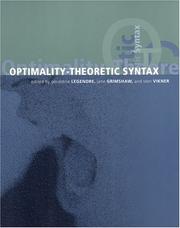
ISBN: 0262316145 0262122359 9780262316149 Publisher: [Boston] : MIT Press,
Abstract | Keywords | Export | Availability | Bookmark
 Loading...
Loading...Choose an application
- Reference Manager
- EndNote
- RefWorks (Direct export to RefWorks)
Grammar, Comparative and general --- Markedness (Linguistics) --- Optimality theory (Linguistics) --- Syntax --- Optimality (Linguistics) --- Optimization (Linguistics) --- Generative grammar --- Marked member (Linguistics) --- Distinctive features (Linguistics) --- Linguistics --- Philology --- LINGUISTICS & LANGUAGE/General

ISBN: 1107113687 0511642709 1282388916 9786612388910 051181240X 0511039778 0511555792 0511053843 9780511039775 9780511053849 9780511812408 9781282388918 0521580196 0521589800 9780521580199 9780521589802 Year: 1999 Publisher: Cambridge, U.K. New York Cambridge University Press
Abstract | Keywords | Export | Availability | Bookmark
 Loading...
Loading...Choose an application
- Reference Manager
- EndNote
- RefWorks (Direct export to RefWorks)
This is an introduction to Optimality Theory, whose central idea is that surface forms of language reflect resolutions of conflicts between competing constraints. A surface form is 'optimal' if it incurs the least serious violations of a set of constraints, taking into account their hierarchical ranking. Languages differ in the ranking of constraints; and any violations must be minimal. The book does not limit its empirical scope to phonological phenomena, but also contains chapters on the learnability of OT grammars; OT's implications for syntax; and other issues such as opacity. It also reviews in detail a selection of the considerable research output which OT has already produced. Exercises accompany chapters 1-7, and there are sections on further reading. Optimality Theory will be welcomed by any linguist with a basic knowledge of derivational Generative Phonology.
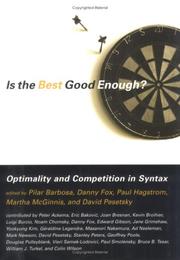
ISBN: 0262522497 Year: 1998 Publisher: Cambridge (Mass.): MIT press
Abstract | Keywords | Export | Availability | Bookmark
 Loading...
Loading...Choose an application
- Reference Manager
- EndNote
- RefWorks (Direct export to RefWorks)
Grammar, Comparative and general --- -Optimality theory (Linguistics) --- -Optimality (Linguistics) --- Optimization (Linguistics) --- Generative grammar --- Comparative grammar --- Grammar --- Grammar, Philosophical --- Grammar, Universal --- Language and languages --- Philosophical grammar --- Linguistics --- Philology --- Syntax --- -Congresses --- Congresses --- Grammar, Comparative --- Optimality theory (Linguistics) --- Congresses. --- -Syntax --- Optimality (Linguistics) --- Syntax&delete&
| Listing 1 - 10 of 39 | << page >> |
Sort by
|

 Search
Search Feedback
Feedback About UniCat
About UniCat  Help
Help News
News